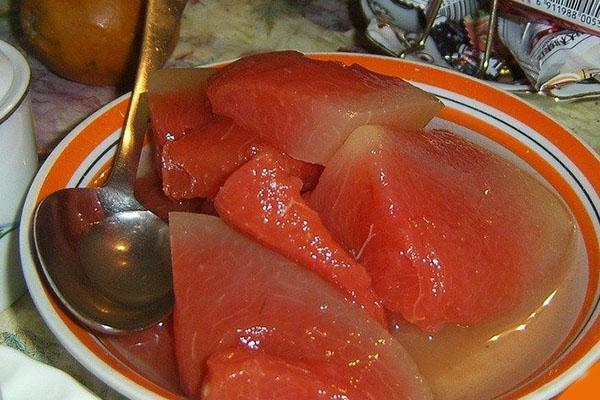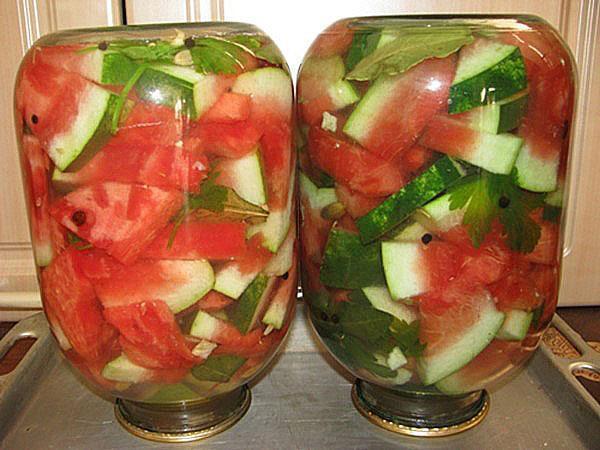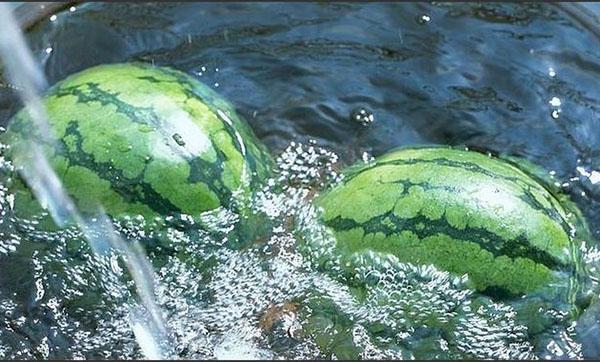How to salt watermelons for the winter in jars

If in summer, as a rule, watermelons - this is a dessert, then in winter this fruit easily turns into an extraordinary snack. It takes on a variety of flavors and can become sour, spicy, salty, and even pungent. It all depends on personal preference.
Watermelon contains many medicinal substances and microelements that have a beneficial effect on the human body. But how to salt watermelons in jars for the winter in order to preserve them as much as possible?
When pickling, for example, acetic acid destroys some of the beneficial compounds and vitamins. In addition, not everyone can eat foods with its content, all the more so for children who, at the sight of a watermelon, have their hands drawn to the delicacy. By replacing the conservation process with natural fermentation, we obtain a natural product in our own juice. Therefore, it is more useful to harvest salted watermelons in jars for the winter, then they can please the whole family.
Before deciding on a recipe for salting watermelons in jars for the winter, you need to choose the right product itself so as not to be disappointed in the taste of the finished dish and not get an upset stomach.
A watermelon with a yellow spot and a bright contrast of stripes is most likely free of chemicals. And the rough, yellowish pulp, its uneven color, multi-colored seeds should alert: most likely the berry is stuffed with nitrates for quick ripening.
Of course, if you salt watermelons whole in barrels, then they turn out to be juicier and differ in taste. But in the conditions of an apartment, this method of cooking becomes impossible. Therefore, there is nothing better than salt watermelons in pieces, using bottles or jars (see. watermelon peel jam - a step by step recipe with pictures).
Recipe for classic salting watermelons with a photo

- watermelon (how much will fit in the bottle);
- 4 tbsp. tablespoons of sugar;
- 1 tbsp. tablespoons of salt;
- 1 teaspoon of citric acid;
- water.
Cooking process:
- Rinse the watermelon well with running water.

- Cut off the thin green rind to a firm white flesh.
- Cut into medium pieces and remove the seeds.

- Rinse the bottles with soda and sterilize.
- Put the watermelon in the finished container and pour boiling water over it. After 10 minutes, drain the water into a saucepan, boil and repeat the process. Drain the water into the saucepan again, add sugar, salt, acid and let the brine simmer for 3-5 minutes.
- Without tamping, put the pieces in jars, pour hot brine. Roll up with sterile lids.

- Place the jars upside down and wrap them in a blanket. Insist for a couple of days, put in a cool place.
For a recipe for salting watermelon in a jar for rolling, the seeds from the pulp should be removed. During fermentation, a very active reaction occurs in them, which can lead to an explosion of the can. If you plan to store the product under a nylon lid or in another non-sealed container, then such cleaning can be omitted.
 Citric acid is often replaced with vinegar unless contraindicated. Add it when pouring the finished brine into jars - 1 tsp. vinegar per 1 liter of product. Aspirin can also serve as a preservative. For each liter of container, 1 tablet is placed and filled with brine.
Citric acid is often replaced with vinegar unless contraindicated. Add it when pouring the finished brine into jars - 1 tsp. vinegar per 1 liter of product. Aspirin can also serve as a preservative. For each liter of container, 1 tablet is placed and filled with brine.
For this recipe, you can use all kinds of spices. Watermelon loves the same spices as cucumber. It can be cherry or currant leaves, dill, garlic cloves, horseradish, ginger, allspice, bay leaf, coriander.
Serve salted watermelon recommended for fatty foods, for easy digestion, or as an independent snack.
For salting, it is recommended to use homemade watermelons without nitrates, since the effect of poisons increases during fermentation. You should choose thin-bore varieties with dense pulp, not overripe. If an unripe fruit is caught, you should not throw it away. You can even roll up greenish watermelons that have not gained sweets. Brine with sugar will fix the situation.
The healthiest way to preserve watermelon is to pickle it in jars without sterilizing it. You cannot roll up such a product - intensive fermentation will tear the jar. It should be stored under nylon caps.
But to store, sometimes, there is not enough will power. I would like to quickly test the finished dish and the blank opens before it is completely salted. How to pickle watermelons in jars for the winter so that you can enjoy them at any time? Watermelons with mustard can be consumed on the third day of cooking. If you keep them for a week, they will turn into a savory aromatic snack with a rich taste.
Recipe for lightly salted watermelons with mustard
 We wash the watermelon and be sure to peel it off (this way they will be salted faster).
We wash the watermelon and be sure to peel it off (this way they will be salted faster).
Cut the fruit into circles, and then cut each circle into 4-6 triangles.
Pour salt, sugar and dry mustard on the plates.
Rub each piece with mustard and dip in salt and sugar. If desired, pepper.
We spread the watermelon in a bottle in layers.
We keep the salting for a couple of days at room temperature, and then we send it to the cellar or refrigerator.
This will make lightly salted watermelons. If you want a more pronounced taste, sprinkle each layer of the lined watermelon triangles with a little salt and sugar.

It is better to start salting watermelons in September. High summer temperatures cause fast and overly intense fermentation and watermelons can oxyderate.
Salted watermelons with honey
 If the sterilization process is replaced by smearing with honey, a natural preservative and an antibiotic, then watermelons will acquire a special fragrant aroma and an unforgettable taste.
If the sterilization process is replaced by smearing with honey, a natural preservative and an antibiotic, then watermelons will acquire a special fragrant aroma and an unforgettable taste.
 Cooking process:
Cooking process:
- Cut the peeled watermelon into pieces.
- Grease the walls of the jars generously with honey.
- Arrange the pieces of watermelon.
- Add well washed currant leaves, a small piece of ginger and 2-3 chopped cardamom pods.
- Pour hot brine (1 tablespoon of salt and sugar per liter of water)
- After 2-3 days of fermentation, the brine should be drained, boiled and refilled.
- You can roll up the finished product.
 Having learned how to properly salt watermelons in jars for the winter, please yourself with this preparation on a cold winter evening. Moreover, the body during this period is sorely lacking in nutrients. Magnesium, potassium, phosphorus, iron, vitamins of group B, P and C, contained in watermelon berries, will easily replenish some of the missing microelements.
Having learned how to properly salt watermelons in jars for the winter, please yourself with this preparation on a cold winter evening. Moreover, the body during this period is sorely lacking in nutrients. Magnesium, potassium, phosphorus, iron, vitamins of group B, P and C, contained in watermelon berries, will easily replenish some of the missing microelements.
I will stay. :-)